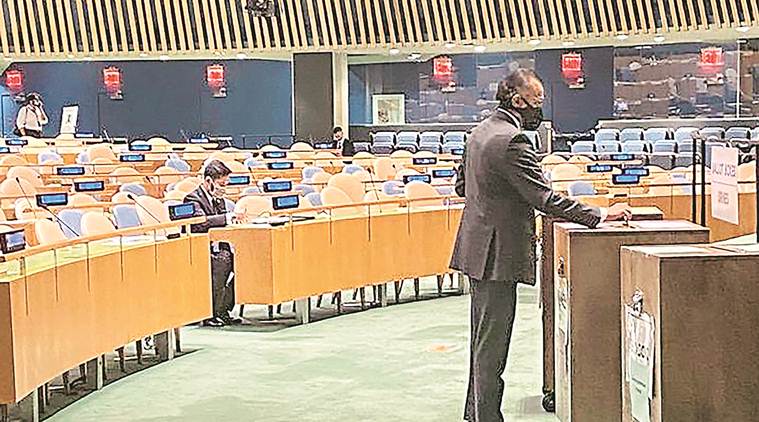 Along with India, Ireland, Mexico and Norway also won the Security Council elections held Wednesday. (File Photo)
Along with India, Ireland, Mexico and Norway also won the Security Council elections held Wednesday. (File Photo)
India has been elected non-permanent member of the UN Security Council for a two-year term, beginning January 2021. This is the eighth time India will sit in the UN body.
Amid the tension between India and China and clashes at the border, New Delhi said that it will act as a “voice of reason and moderation” and a “firm believer in respect for international law and peaceful settlement of disputes”.
While India got 184 out of the 192 valid votes polled, sources said that eight countries that did not vote for India possibly included Pakistan. Since it’s a secret ballot, it is not known who votes for whom.
Prime Minister Narendra Modi said he was “deeply grateful” for the overwhelming support from the international community.
There were five vacant seats in the UNSC, of which four were filled by the first round of voting on Wednesday. Along with India, Kenya, Ireland, Mexico and Norway obtained the requisite two-thirds majority in the General Assembly.
However, the fifth African seat remained vacant and will go into the second round, with Kenya and Djibouti fighting it out.
Due to the Covid-19 situation, special rules were made for voting, with diplomats submitting their ballots during pre-arranged time slots in the General Assembly hall.
India was the sole candidate for a non-permanent seat from the Asia-Pacific category. Its victory was expected since it had already got endorsement from the 55-member Asia Pacific group, including China and Pakistan, last year.
India has earlier been elected as a non-permanent member for the years 1950-1951, 1967-1968, 1972-1973, 1977-1978, 1984-1985, 1991-1992 and 2011-2012.
 India casts its ballot during the UNSC election in the General Assembly. (Source: Twitter)
India casts its ballot during the UNSC election in the General Assembly. (Source: Twitter)
“Deeply grateful for the overwhelming support shown by the global community for India’s membership of the UN Security Council,” PM Modi tweeted after the election on Thursday.
In New Delhi, Ministry of External Affairs Secretary (West) Vikas Swarup said, “India was elected unopposed as we were the sole candidate for the Asia-Pacific seat. However, this was made possible because Afghanistan had withdrawn in our favour in 2013 for which we thank the Government of Afghanistan.”
He said that the strong support by almost the entire UN membership for India’s election demonstrates the goodwill India enjoys in the UN and the confidence of the international community in India’s capability to contribute to the work of the Council.
“As a founding member of the UN, India is fully committed to the Principles and Purposes of the UN Charter. As the world’s largest democracy, a major contributor to UN peacekeeping operations and a strong votary of the rights of developing countries, India will bring its own unique strengths and perspective to the Security Council. We will act as a voice of reason and moderation and a firm believer in respect for international law and peaceful settlement of disputes. In fact, India has all the credentials to serve on the UN Security Council,” he said.
He said that India’s work in the Council will be guided by the PM’s call for a ‘Reformed Multilateralism’ and 5-S vision for foreign policy—Samman (Respect), Samvad (Dialogue), Sahyog (Cooperation) and Shanti (Peace) to create conditions for universal Samriddhi (Prosperity).
He said India will be “seeking responsible and inclusive solutions”, “concrete and result-oriented action at the Security Council for an effective response to international terrorism”, “reformed Multilateralism to reflect contemporary realities”, “a comprehensive approach to peace and security, guided by dialogue, mutual respect, commitment to international law, for which we also hope to help streamline UN Peacekeeping” and “technology with a human touch”.
“The Covid-19 pandemic is perhaps one of the most serious crises this generation has faced. We believe the current crisis offers us new opportunities to seek innovative and inclusive solutions by using multilateralism and international cooperation,” Swarup said, adding that “it is clear to us that the UN and indeed multilateralism itself needs to change to reflect contemporary realities to remain effective and credible.”